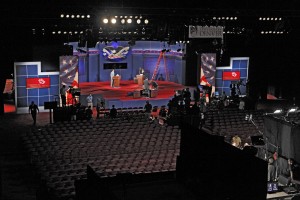
The first presidential debate in Denver today is seen by BYU students and faculty as a potential deal-breaker for undecided voters.
Chris Karpowitz, BYU political science professor, said he believes one presidential candidate will not outshine the other, but the upcoming debate has a potential to sway undecided voters.
“When political scientists have looked back over the debates, they find that the debates are usually not the determining factor in an election,” Karpowitz said. “Now this year it’s very close, and it’s likely to be very close until the end. The debates are one of the last pieces of evidence that undecided voters will have.”
The debate in Denver will cover each candidate’s domestic policy. The debators will each have allotted time to discuss their own policy and refute the opposing. Karpowitz added that both sides may address the government’s role in American society as well.
“Both of them are going to want to talk about the role of government. What is the role of government in the United States? Mitt Romney will want to make an argument for a smaller government, one that spends less and that is less likely to go into debt,” Karpowitz said. “President Obama will make an argument about the role of government in promoting infrastructure, helping those who are the poorest, helping students — those kinds of roles for government.”
Like Karpowitz, BYU students also have similar expectations for the upcoming debate. Tanner Camp, political science major, is a liaison for BYU Political Affairs Society. The group is an organization that plans events to help people get politically involved. Camp, an independent, sees the debates as a crucial time for voters and undecided voters to truly see the candidates’ true colors.
“The debate really helps people see — what does this person actually believe in, what is this person actually going to fight for and what is this person promising,” Camp said. “Because then you can hold them accountable, and you can see if their views really do represent what your views are.”
Camp also expressed the importance for Americans to watch the debate in order to make decisions for themselves.
“Its important to see what a candidate actually does believe and what he is going to fight for,” Camp said. “The debates are a much better guide to your vote than simply just those superficial qualities.”
Quin Monson, BYU political science professor, teaches students about public opinion and voting behavior in the political world. Although Monson expects both candidates to do well, he pointed to the analyses after the debate to influence voters who are still undecided.
“What is really important is the post-debate analysis and the post-debate spin,” Monson said. “Each of the candidates will have their surrogates and allies positioned after the debate to make the case for why their candidate won.”
Despite whoever the analysts crown as winner, Monson expects that most voters will continue to lean towards their own political ideologies and selective perceptions.
“I don’t expect it to be unusually imbalanced in terms of how well someone does,” Monson said. “I think that they are pretty evenly matched. In that case, what is likely to happen is that each candidate’s supporters are likely to think that their candidate did well, because the candidates will deliver messages that their base responds to and that the opposition is not receptive to.”
BYU student Matthew Macdonald, a nutritional science major from Mesa, Ariz., has hopes that the campaign will demonstrate what each candidate stands for. Macdonald recently joined the BYU Democrats. His mom is a Republican, and his dad is a Democrat. Despite this, he has recently engaged in figuring out his political stance as both the election and the debates are nearing. Macdonald expressed what he wants to see from both presidential candidates at the debates in Denver.
“I want to hear what each of the candidates really believe and what they would do in their four years as president,” Macdonald said. “I do not believe that either one will solve the world’s problems, but I do want to hear what their passion is and what they will focus on, how they handle Middle East situation, how they handle health care, what they hope for education. I hope that we can all listen to both men and make our own decisions. I think both candidates are both family men, and I am excited to be a first-time voter.”
The upcoming presidential debate will take place at 7 p.m. today in Denver. The Universe sent a staff of students to cover the debate. For live coverage, go to www.universe.byu.edu, watch on 11News or follow us on twitter @universemetro.




